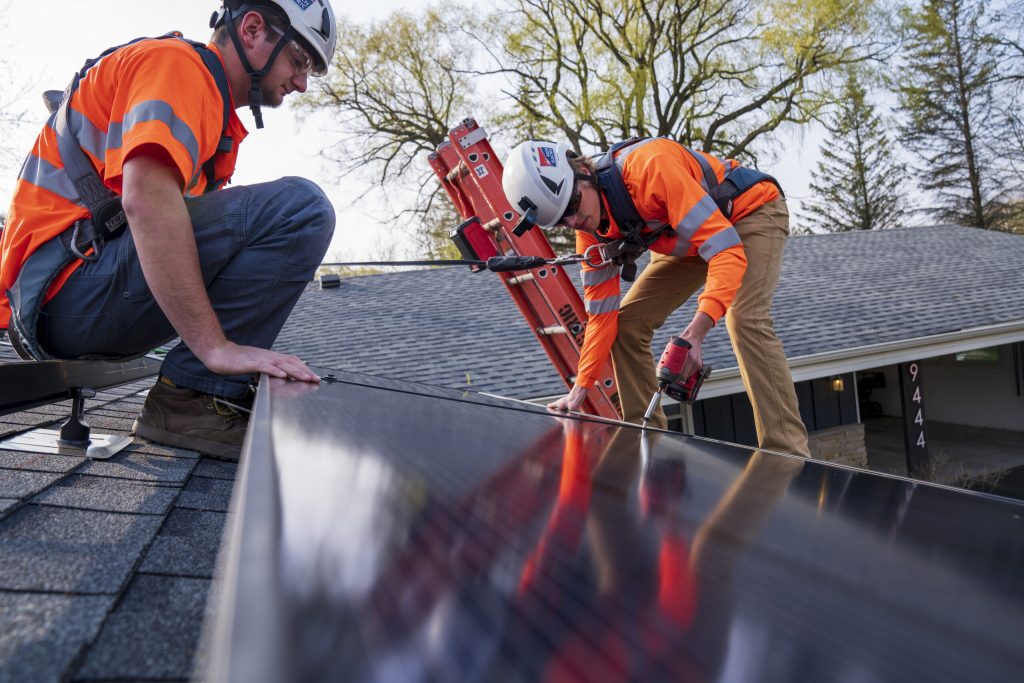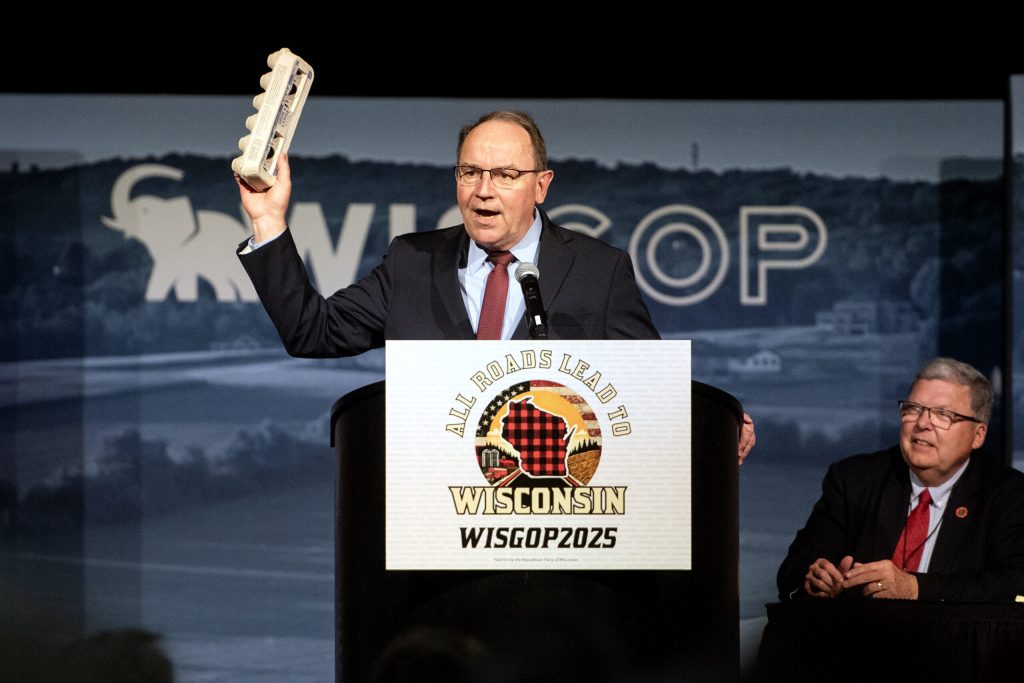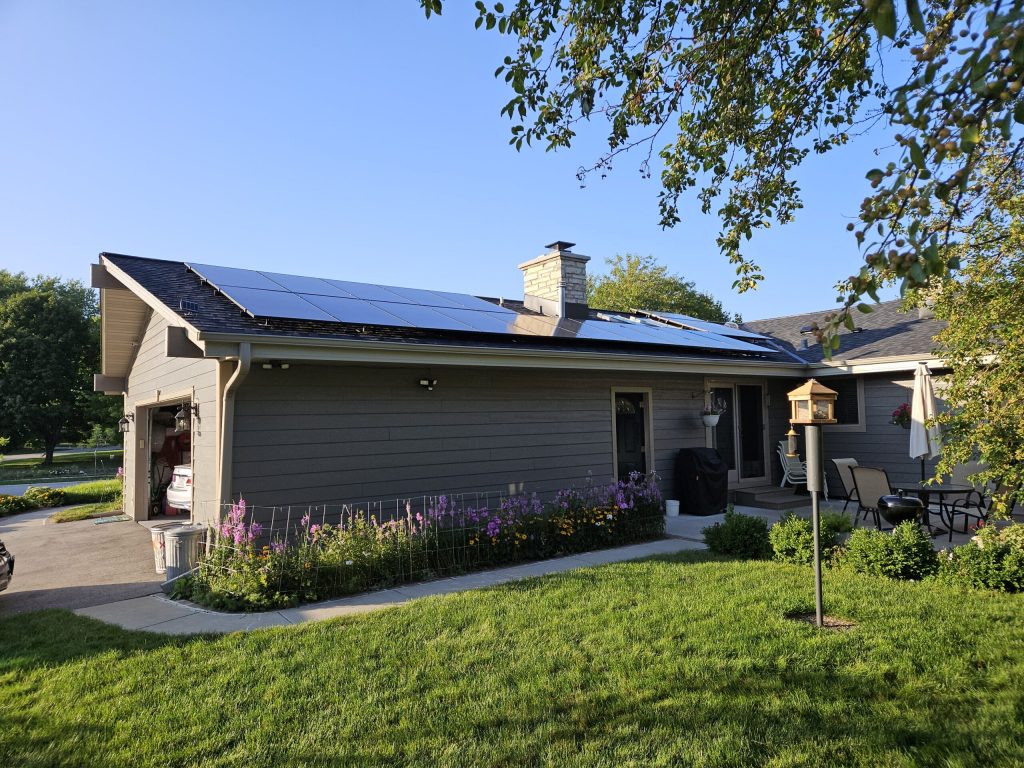Republican Budget Bill Would Eliminate Energy Efficiency Tax Credits
Considering solar panels or a heat pump? Don't wait.

Contractors with Arch Solar install rooftop solar panels on a home in southeastern Wisconsin. Photo courtesy of Arch Solar
The clock is ticking for Wisconsin homeowners who want to take advantage of tax credits for clean energy and home energy efficiency as Republicans in Congress seek to phase out those incentives.
The most recent federal data shows more than 73,000 families in Wisconsin have taken advantage of the tax credits. However, those incentives would disappear as soon as the end of this year under the House budget bill and six months after a bill is passed in the Senate version introduced this week.
Republicans have taken aim at the expanded tax credits under the Inflation Reduction Act, which were intended to combat climate change, as they seek to pay for President Donald Trump’s $4.5 trillion tax cuts.
Kevin Kane, chief economist with Green Homeowners United, said the repeal will make it more difficult for middle- and low-income families to make home upgrades or install rooftop solar.
“I think there’s going to be a mad dash for people to try to use it,” Kane said.
Tax credits provide a dollar-for-dollar reduction on what people owe in federal taxes. Residents can claim 30 percent of the cost for heat pumps up to $2,000 each year and up to $1,200 each year for insulation, air sealing and ventilation. They can also claim 30 percent of the cost to install geothermal heating, solar panels and battery storage.
In Wisconsin, families claimed an average of more than $5,100 on clean energy investments like rooftop solar, according to the most recent federal data. On home improvements, they claimed an average of $761 on things like heat pumps, air conditioners and windows.
Angie Kochanski, director of business development at Arch Solar, said they’re expecting that the elimination of tax credits will dramatically shrink the market for residential solar installations.
“We’ll adjust. It’s going to be a new era, and there’s going to be a smaller market of buyers, and we’re all going to have to work a little bit harder,” Kochanski said.
Solar companies have already been facing a dip in residential solar installations, which declined 31 percent last year due in part to higher interest rates.
Arch Solar installed solar on about 240 homes in southeastern Wisconsin last year, and the company anticipates that number could grow to 300 homes this year as homeowners try to act before tax credits disappear.
Rooftop solar installations could drop by half next year
Cory Neeley, executive director of SolarShare Wisconsin Cooperative, said the repeal is a huge slap in the face for businesses that have been scaling up their operations.
“These companies are going to have a hard time planning for any additional work. They’re also just going to see a huge glut of solar panels on the market,” Neeley said. “Because this market existed, and then all of a sudden, there’s no demand for it.”
Under ideal circumstances, Kochanski added, contractors need around six to 10 weeks to obtain permits or approval from utilities to connect with the grid.
Energy data firm Ohm Analytics estimates residential solar installations could fall by half next year. Wisconsin labor and clean energy advocates have said repealing the tax credits could jeopardize thousands of jobs.
Kathy Kuntz, director of the Dane County Office of Energy and Climate Change, said it’s not the time to sit on the fence if residents and businesses are thinking about home energy upgrades.
She said installation of solar and energy efficient appliances helps reduce costs for homeowners and demand on the grid at a time when the nation has seen increased electricity demand from data centers.
“I’m just concerned that it’s the wrong moment to slow down the consumer and business investment in clean energy given what else is going on with the grid,” Kuntz said.

US Rep. Tom Tiffany holds an egg carton as he begins his speech Saturday, May 17, 2025, during the Republican Party of Wisconsin State Convention in Rothschild, Wis. Angela Major/WPR
All Wisconsin Republicans in the U.S. House voted for the budget bill and its provisions to repeal tax credits. In a social media post Tuesday, Republican Rep. Tom Tiffany urged people to tell their senators not to “water down” the House bill.
“We must terminate the IRA and stop wasting taxpayer dollars on wind and solar subsidies,” Tiffany said.
In Green Bay, the city’s sustainability commission unanimously passed a resolution Thursday to support the retention of clean energy funding and tax credits. Ahead of the vote, the commission’s chair Christa Kananen said the city’s clean energy plan relies heavily on leveraging tax credits to reach its goal to become carbon-neutral by 2050.“The loss of that federal spending would significantly impact the plan that’s already been outlined and is in progress,” Kananen said. “It would, at a minimum, slow it down significantly.”
As tax breaks seem likely to fade away, Kuntz noted Wisconsin residents can still take advantage of home rebates under the Home Efficiency Rebate, or HOMES, program for installing insulation and energy-efficient heating and cooling systems.
Wisconsin received $149 million to administer home rebates under the program and the Home Electrification and Appliance Rebate, or HEAR, program for households installing heat pumps and other electrical appliances. That funding is not in jeopardy, and it’s expected to last another two to three years.
Time is running out for Wisconsin homeowners to make use of home energy tax credits was originally published by Wisconsin Public Radio.
If you think stories like this are important, become a member of Urban Milwaukee and help support real, independent journalism. Plus you get some cool added benefits.






















Making America Great by endorsing technology from the 1800’s.. How long will it be before our Orange-faced Moron-in-Chief offers Trump Coal, Trump Kerosene, and Trump Whale Oil?
He’s already cornered the snake oil market, with MAGA morons just turning a blind eye to all of it.
Republicans seem to NOT know that they are creating THEIR children’s, grandchildren’s futures.